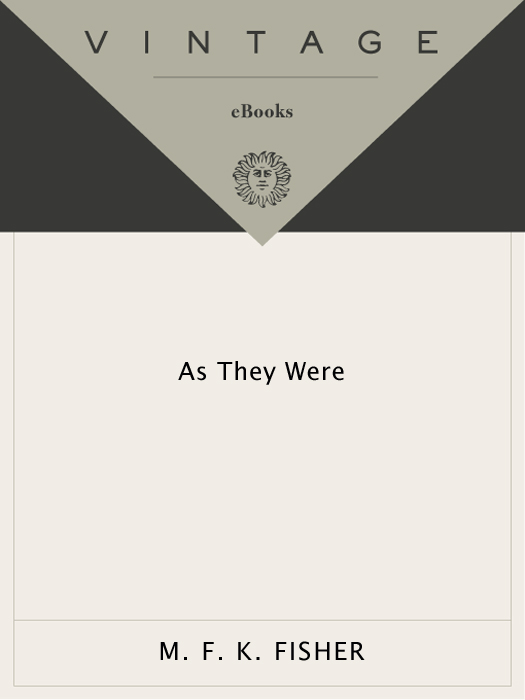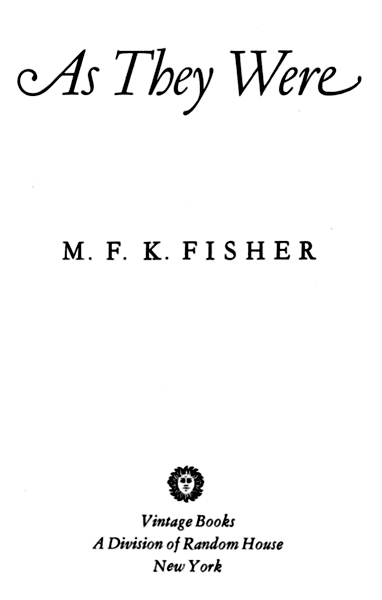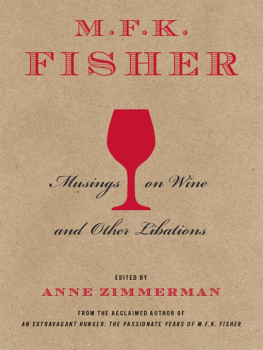Fisher - As They Were
Here you can read online Fisher - As They Were full text of the book (entire story) in english for free. Download pdf and epub, get meaning, cover and reviews about this ebook. City: New York;United States, year: 1983;2011, publisher: Knopf Doubleday Publishing Group;Vintage Books, genre: Non-fiction. Description of the work, (preface) as well as reviews are available. Best literature library LitArk.com created for fans of good reading and offers a wide selection of genres:
Romance novel
Science fiction
Adventure
Detective
Science
History
Home and family
Prose
Art
Politics
Computer
Non-fiction
Religion
Business
Children
Humor
Choose a favorite category and find really read worthwhile books. Enjoy immersion in the world of imagination, feel the emotions of the characters or learn something new for yourself, make an fascinating discovery.

- Book:As They Were
- Author:
- Publisher:Knopf Doubleday Publishing Group;Vintage Books
- Genre:
- Year:1983;2011
- City:New York;United States
- Rating:5 / 5
- Favourites:Add to favourites
- Your mark:
- 100
- 1
- 2
- 3
- 4
- 5
As They Were: summary, description and annotation
We offer to read an annotation, description, summary or preface (depends on what the author of the book "As They Were" wrote himself). If you haven't found the necessary information about the book — write in the comments, we will try to find it.
Fisher: author's other books
Who wrote As They Were? Find out the surname, the name of the author of the book and a list of all author's works by series.
As They Were — read online for free the complete book (whole text) full work
Below is the text of the book, divided by pages. System saving the place of the last page read, allows you to conveniently read the book "As They Were" online for free, without having to search again every time where you left off. Put a bookmark, and you can go to the page where you finished reading at any time.
Font size:
Interval:
Bookmark:


First Vintage Books Edition, May 1983
Copyright 1955, 1961, 1979, 1981, 1982 by M. F. K. Fisher All rights reserved under International and Pan-American Copyright Conventions. Published in the United States by Random House, Inc., New York, and simultaneously in Canada by Random House of Canada Limited, Toronto. Originally published by Alfred A. Knopf, Inc. in 1982.
Grateful acknowledgment is made to Alfred A. Knopf, Inc., for permission to reprint Prejudice, Hate, and the First World War from Among Friends, Copyright 1971 by M. F. K. Fisher. Two Kitchens in Provence, Wind-Chill Factor: A Problem of Mind and Matter and The Changeover originally appeared in The New Yorker. Wartwort originally appeared in A Cordiall Water by M. F. K. Fisher, published by North Point Press. Gare de Lyon originally appeared in Not a Station But a Place by Judith S. Clancy, published by Synergistic Press. Some of the other pieces in this collection have appeared previously in The Atlantic Monthly, Gastronome, House and Garden, and House Beautiful.
Library of Congress Cataloging in Publication Data
Fisher, M. F. K. (Mary Frances Kennedy), 1908
As they were.
I. Title.
AC8.F52 1983 081 82-40427
eISBN: 978-0-307-77919-9
v3.1
For Norah, again and always
Arles

In the sixties, my fine old house in St. Helena seemed hollow, with the children gone. I said, Mary Frances, now is the time to go to new places and find different views of things.
Friends kept the hearth warm and the animals happy, and other friends let me stay in their own places when they were away. It was a vivid period of slow wandering, very rich, like a carpet I had often trod before I realized that it was there.
One winter I went to Long Island to a house I knew well from several summer visits. It was on the dunes near Bridgehampton. There was a car, so that I could drive into the village for mail and food. I cashed checks at the liquor store next to the grocery. I liked the tough fellow there, and when I went back after several months in Sag Harbor, I liked him even more, because he laughed with real pleasure when he saw me, and said, God, were we glad to get you off the dunes and outta here!
I knew why, because he was one of the volunteer firemen who would have risked their lives to reach the house if they knew I was without heat or help. They did not want to die, any more than I did, but
The story I wrote about that incident is called The Wind-Chill Factor, and the house I lived alone in, except for rare weekends with its owner who came down from her job in New York, was a deliberate contradiction of the local wisdom: natives of that part of the Island build and farm and work inland. Only ignorant summer people stay along the blandly beautiful beaches, flirting in bland ignorance with hurricanes and such.
My house had been partly demolished in the last Big Blow, but was solid again and partly winterized, as was then said, and my hostess and I agreed that I was indeed a lucky person to face a cozy winter there. I holed in.
After what I reported in The Wind-Chill Factor, I knew that many more lives than mine depended on whether my lights had gone off, those three or four wild nights, and I moved to a one-room flat in Sag Harbor. I had the parlor and bathroom of what had once been a whaler captains house, with a cursory kitchenette at one end. I was warm and quiet, and worked steadily because there was nothing else to do. Outside, everything was mostly silence, because the snow stayed high for weeks at a time, and it was arduous to shuffle down the narrow high tunnels of sludge that led to the post office and the grocery store.
Fortunately, right across from my lodging was a small boozerie owned by a handsome Greek who was paraplegic from a railroad accident. We talked nostalgically about good wines, and I came to enjoy and even appreciate popular jug-stuff.
I never capitulated to the currently popular fizz wines, carbonated mixtures of fruit juices and dregs, but through the thin back wall into the apartment that had once been the captains dining room I often listened to a young fisherman, laid off during the bad weather, drink himself worse than silly on something like Thunderhead or Tango-Tango and then commit conjugal rape on his very devout wife every Saturday night, so that she could not receive Communion the next morning, after her Saturday Confession. Ho-hum. Their baby, about six months old, wailed a lot. They lived in a somewhat smaller parlor than mine, and there was always that half-gallon jug handy, under the bed.
My Greek friend and I talked in a detached casual way about this.
The Wind-Chill Factor taught me that there is a difference between what is true and what one believes is the truth. I depicted the storm in as bare a way as I could, since it had happened only to me. During the strange ordeal, there was nobody else, to observe or even survive. It was a true catharsis.
For a few days, after it, I felt floaty and emptied. And I had to face the fact that all my vague plans to write about an earlier life were crude fabrications of a fertile and fairly articulate mind. I wanted suddenly to write about my first years, for some unknown pushing reason, and I saw, after the wind on the dunes, that nobody but a child can write what has just happened to him. It is almost impossible for an older person to report such things without coloring them, twisting, invading the story, to make a more vivid or more self-flattering report.
In Sag Harbor I was almost always alone, for the months I was there. I never felt lonely, though, because that is not my bent. Some might say my life was austere. With an occasional glass of California jug-ros from the little icebox that hummed along in a corner of my room, I tried to go as far back as I could into the life I honestly believed I had lived when I was four, or even ten. It was a sweaty job, at times painful.
People in Whittier have been hurt by some of the storys candor (not many, nor much, I hope). But since the time on the dunes, and then in Sag Harbor, I know that I can never write polite tomfoolery again, if I ever did.
So this report about some first days is not much more than a proof that ghetto children can survive as happy people if they are part of a close loving family.
By ghetto I do not mean slum, which now seems to spell the word to many people. I mean a small community within a larger one, where people of a certain ethnic or religious kind are segregated, either by choice or by unwritten laws. Whittier itself was a ghetto of Quakers who founded the little town so that they could live apart from other white Christians. Within its quiet bounds were a few intruders like us: a handful of Catholics and Protestants, now and then a Jewish family to run the five-and-ten, never a black person. I wanted to call the book: Child of an Inner Ghetto, but by the late sixties the term had apparently lost its real meaning to everybody but me. We lived happily in an enclave within a bigger enclave.
Font size:
Interval:
Bookmark:
Similar books «As They Were»
Look at similar books to As They Were. We have selected literature similar in name and meaning in the hope of providing readers with more options to find new, interesting, not yet read works.
Discussion, reviews of the book As They Were and just readers' own opinions. Leave your comments, write what you think about the work, its meaning or the main characters. Specify what exactly you liked and what you didn't like, and why you think so.














